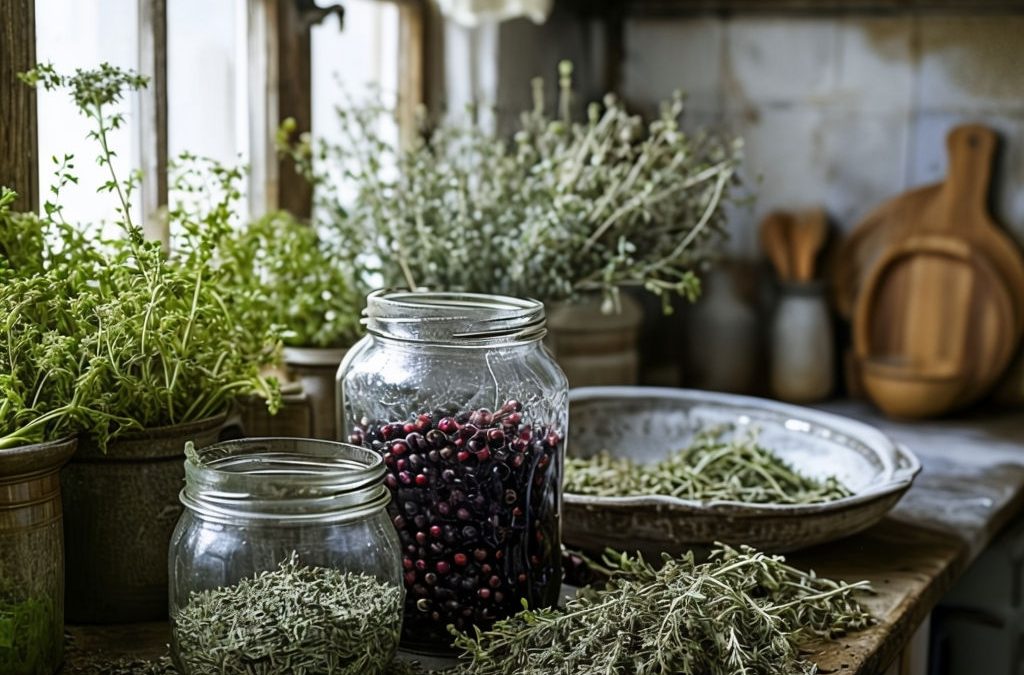This post may contain affiliate links, to learn more about them, check out our Disclosure.
The medicinal properties of elderberry preparations can vary depending on the extraction method used. Two common methods are alcohol-based tinctures and acidic (vinegar-based) tinctures. Understanding the differences between these two can help you choose the most appropriate preparation for your needs.
Overview of Tinctures
- Elderberry Tincture (Alcohol-Based):
- Made by steeping elderberries in alcohol (commonly vodka or brandy).
- Alcohol acts as a solvent, extracting a wide range of phytochemicals from the berries.
- Typically has a long shelf life due to the preservative nature of alcohol.
- Acidic Elderberry Tincture (Vinegar-Based):
- Prepared by soaking elderberries in acidic mediums like apple cider vinegar.
- Vinegar extracts different compounds and offers additional health benefits.
- Suitable for individuals avoiding alcohol, such as children, pregnant women, or those with alcohol sensitivities.
Detailed Comparison
1. Extraction Efficiency
Alcohol-Based Tinctures:
- Broad Spectrum Extraction: Alcohol is a potent solvent that effectively extracts both water-soluble and alcohol-soluble compounds, including flavonoids, antioxidants, vitamins, and essential oils.
- Higher Potency: Generally results in a more concentrated and potent extract, delivering a robust profile of elderberry’s medicinal properties.
Acidic (Vinegar-Based) Tinctures:
- Selective Extraction: Vinegar excels at extracting minerals, certain vitamins, and some organic acids but may be less efficient at extracting some alcohol-soluble compounds.
- Additional Benefits: Apple cider vinegar itself has health benefits, including aiding digestion, regulating blood sugar levels, and possessing antimicrobial properties, which can complement the effects of elderberries.
2. Shelf Life and Preservation
Alcohol-Based Tinctures:
- Extended Shelf Life: The high alcohol content acts as a preservative, allowing the tincture to remain effective and safe to use for several years when stored properly.
- Stability: Less prone to microbial growth and spoilage over time.
Acidic (Vinegar-Based) Tinctures:
- Moderate Shelf Life: Vinegar also has preservative qualities but to a lesser extent than alcohol. These tinctures typically last between 6 months to 1 year when stored correctly.
- Storage Considerations: Should be stored in a cool, dark place to maximize shelf life and prevent degradation.
3. Taste and Versatility
Alcohol-Based Tinctures:
- Strong Flavor: Can have a sharp, intense taste due to the alcohol content, which some individuals may find unpleasant.
- Usage: Often taken in small doses due to potency; can be diluted in water, juice, or tea to improve palatability.
Acidic (Vinegar-Based) Tinctures:
- Milder Flavor: Possess a tangy, acidic taste that can be more palatable and easily incorporated into foods like salads, dressings, or beverages.
- Culinary Applications: Versatile in cooking and can be used as a flavorful addition to various dishes while providing health benefits.
4. Suitability and Accessibility
Alcohol-Based Tinctures:
- Not Suitable for All: May not be appropriate for children, pregnant or breastfeeding women, individuals with alcohol sensitivities, or those abstaining from alcohol for personal or health reasons.
- Regulatory Restrictions: In some regions, there may be restrictions on the purchase or use of alcohol-based products.
Acidic (Vinegar-Based) Tinctures:
- Inclusive Use: Safe and suitable for a broader audience, including those who need or prefer to avoid alcohol.
- Ease of Preparation: Vinegar is widely available and often more affordable than high-proof alcohol, making it accessible for home preparations.
5. Medicinal Properties and Applications
Alcohol-Based Tinctures:
- Immune Support: Effective in delivering concentrated doses of elderberry’s antiviral and immune-boosting properties, making it useful for preventing and treating colds and flu.
- Antioxidant Rich: High in antioxidants that help combat oxidative stress and inflammation.
- Rapid Absorption: Alcohol facilitates quick absorption of the active compounds into the bloodstream.
Acidic (Vinegar-Based) Tinctures:
- Gentle Immune Support: Provides immune-enhancing benefits, though potentially less concentrated than alcohol-based versions.
- Digestive Health: Combines the digestive benefits of vinegar with elderberry’s properties, supporting gut health.
- Blood Sugar Regulation: May aid in maintaining healthy blood sugar levels due to the acetic acid in vinegar.
Summary Table
| Aspect | Alcohol-Based Tincture | Acidic (Vinegar-Based) Tincture |
|---|---|---|
| Extraction Efficiency | Broad spectrum, high potency | Selective extraction, additional vinegar benefits |
| Shelf Life | Long (several years) | Moderate (6 months to 1 year) |
| Taste | Strong, sharp | Milder, tangy |
| Suitability | Adults without alcohol restrictions | Suitable for all ages and those avoiding alcohol |
| Medicinal Properties | Potent immune support, antioxidant-rich, quick absorption | Gentle immune support, digestive aid, blood sugar regulation |
| Usage Versatility | Taken in small doses, can be diluted | Can be incorporated into foods and beverages |
Both alcohol-based and acidic elderberry tinctures offer valuable health benefits, but they differ in extraction efficiency, potency, shelf life, taste, and suitability for various individuals. Your choice between the two should be guided by your specific health needs, personal preferences, and any dietary or lifestyle considerations.
Choose Alcohol-Based Tincture If:
- You seek a highly potent and concentrated form of elderberry’s medicinal properties.
- You are comfortable with alcohol consumption in small amounts.
- You prefer a longer-lasting preparation.
- Choose Acidic (Vinegar-Based) Tincture If:
- You prefer or require an alcohol-free option.
- You want to enjoy additional health benefits provided by vinegar.
- You intend to use the tincture in culinary applications for added flavor and health benefits.
Note: Regardless of the type, always use tinctures responsibly and consult with a healthcare professional, especially if you have underlying health conditions, are pregnant, breastfeeding, or administering to children.
Preparation Tips:
- Ensure you use high-quality, organic ingredients for maximum health benefits.
- Follow proper sterilization and storage practices to maintain the tincture’s efficacy and safety.
- Start with small doses to assess your body’s response and adjust accordingly.
Safety Precautions:
- Avoid using raw elderberries without proper preparation, as they can be toxic. Cooking or proper processing neutralizes these compounds.
- Be aware of any potential allergies or adverse reactions to elderberries or other components used in the tinctures.
By understanding these differences, you can make an informed decision and effectively utilize elderberry tinctures to support your health and wellness.



